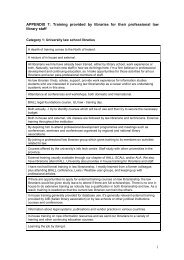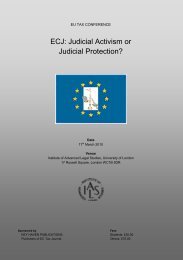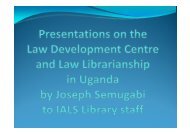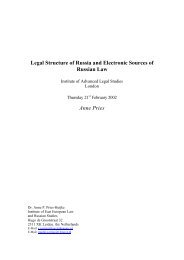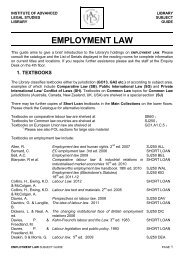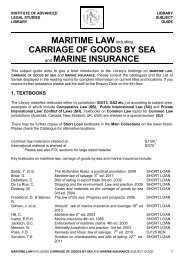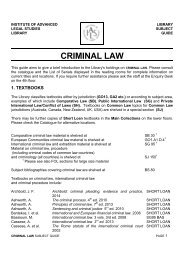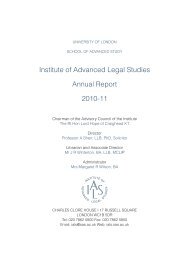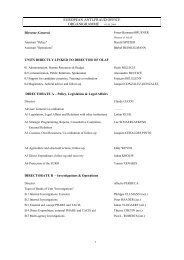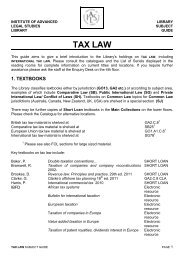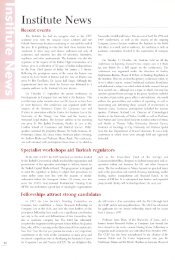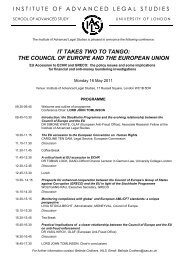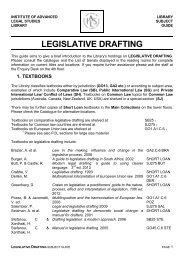a thesis - Institute of Advanced Legal Studies
a thesis - Institute of Advanced Legal Studies
a thesis - Institute of Advanced Legal Studies
You also want an ePaper? Increase the reach of your titles
YUMPU automatically turns print PDFs into web optimized ePapers that Google loves.
INVALIDATING CAUSES. 77<br />
Guardian and ward (Hatch v. Hatch (1804), 9 Ves. 292; Mattland<br />
v. Irving (1846), 15 Sim. 437);<br />
Minister <strong>of</strong> religion and disciple and the like (see Hnguenin v.<br />
Baaeley (1807), 14 Yes. 273; Allcardv. Skinner (1887), 36 Ch. D.<br />
145 ; Morley v. Loughnan, (1893) 1 Ch. 736);<br />
Solicitor and client (Liles v. Terry and idfe, (1895) 2 Q. B.<br />
679 ; Willis v. Barron, (1902) A. C. 271; Wright v. Carter, (1903)<br />
1 Ch. 27);<br />
Medical adviser and patient (Mitchett v. Homfray (1881), 8<br />
Q. B. D. 587).<br />
But it is not confined to these. It applies " to all the variety<br />
<strong>of</strong> relations in which dominion may be exercised by one person<br />
over another," to quote from the argument <strong>of</strong> Sir S. Eomilly in<br />
Huguenin v. Baseley.<br />
Gifts liable to be set aside by the court on the ground <strong>of</strong><br />
undue influence have always been treated as voidable and not<br />
void. Wright v. Vanderplank and Mitchell v. Homfray are authorities<br />
for this. Moreover, such gifts are voidable on equitable<br />
grounds only. The right to set them aside may therefore be lost<br />
by laches and acquiescence, as the case <strong>of</strong> Alkard v. Skinner itself<br />
shows.<br />
MISTAKE.<br />
If a settlement is made under a mistake, or a misapprehension<br />
<strong>of</strong> the effect <strong>of</strong> it, it is likewise not binding on the settlor, and can<br />
be set aside by the court. The case <strong>of</strong> Forshaw v. Welsby (1860,<br />
30 Beav. 243) is an instance <strong>of</strong> this. The settlement in that case<br />
was made when the settlor was very ill and, as the court found<br />
(p. 247), when he thought he was going to die, and he did not<br />
intend it to be operative if he survived. He, however, recovered<br />
from his illness, having in the meantime lost all recollection <strong>of</strong><br />
having executed the settlement. Although there was no undue<br />
influence or pressure exercised on the settlor, the court set the<br />
settlement aside on his application.<br />
Everett v. Everett (1870, L. E. 10 Eq. 405) was a somewhat<br />
similar case, the settlement there being set aside apparently on the<br />
ground that the settlor—a young lady who had only just attained<br />
twenty-one—had not understood the effect <strong>of</strong> it; but the court was<br />
also influenced by the fact that she had not had independent advice,<br />
and that it was a rather imprudent disposition <strong>of</strong> her property.



